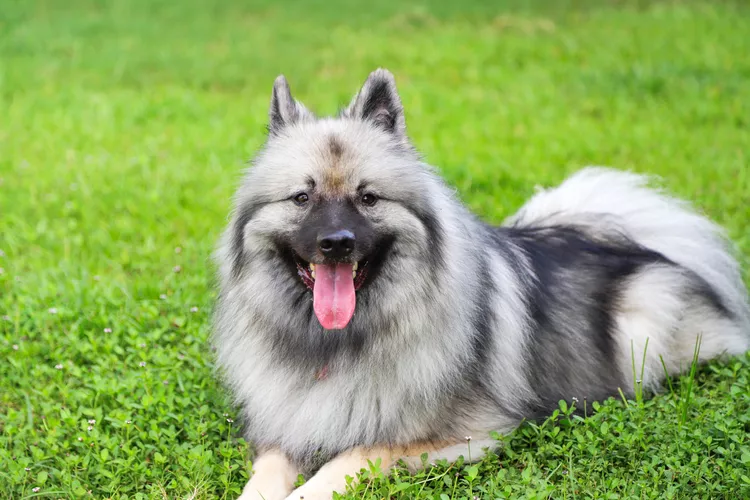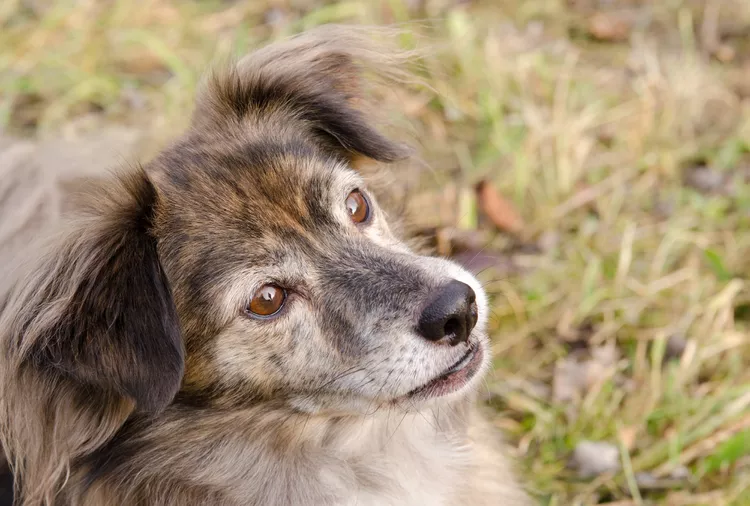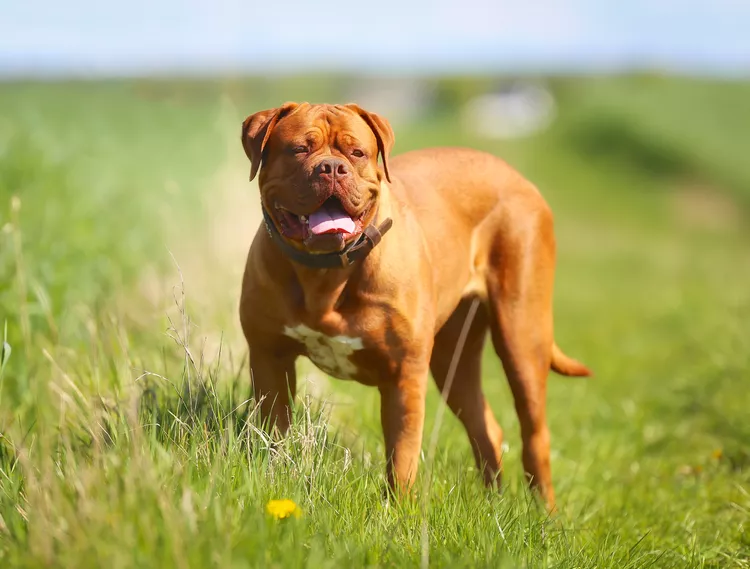
Bruxism is the act of grinding teeth together using the jaw muscles. This can include the actions of clenching or striking the teeth together. Teeth grinding is well known among humans, but it can occur in dogs as well. Mild teeth grinding may not cause any issues, but frequent grinding or clenching of the teeth can lead to problems with the teeth and jaw.
Not all dogs grind their teeth. When they do, there are a few potential reasons why.
Many dogs will grind their teeth as a response to pain or discomfort. Dogs don't typically exhibit signs of pain the way humans do. Many dogs try to hide their pain by acting as normal as possible; this is part of their survival instinct. A small behavior like teeth grinding may be the only hint you have that there is something wrong in your dog's mouth.
Potential causes of oral pain include periodontal disease, rotten teeth, oral infections, fractured teeth, injury to the oral mucous membranes or tongue, and oral growths or tumors. Some puppies will grind their teeth while they are teething or when there is a loose tooth. Fortunately, most puppies grow out of the behavior once their adult teeth have come in.
A malocclusion occurs when there are misaligned teeth preventing the jaws from closing the teeth together properly and evenly. In dogs, it is sometimes called an "abnormal bite" and may be seen as an underbite or overbite. Malocclusions cause the teeth to grind against other teeth involuntarily as a part of normal mouth movement.
Just like oral pain can make some dogs grind their teeth, pain or discomfort in the esophagus, stomach, or intestines can do the same. Teeth grinding in response to pain may be a way for dogs to self-soothe or distract from the pain.
Stress and anxiety are leading causes of bruxism in humans. In dogs, this reaction to anxiety and stress is less common but can still occur. This type of teeth grinding may happen unconsciously while dogs sleep. Some dogs may have focal seizures where the only thing noticed is teeth chattering.
Mild, infrequent teeth grinding may not cause problems in a dog. However, over time, grinding the teeth can cause significant wear to the tooth enamel and dentin. Once worn down enough, the teeth may become severely painful and damaged. If the pulp inside the tooth becomes exposed, the dog may develop a serious infection.
You may not be aware of your dog's teeth grinding at first. The sound of it may be subtle or it may sound like chattering or grinding. You may or may not see the movement of the jaw muscles and mouth unless you look very closely.
Do not ignore teeth grinding in your dog, even if it seems mild. If you notice signs of teeth grinding in your dog, be sure to contact your veterinarian's office to schedule an appointment. The vet will evaluate your dog's mouth and do a physical examination to look for an underlying cause.
Your vet will likely recommend lab tests or imaging to evaluate your dog's organ function and overall health. These tests may reveal underlying conditions that might be causing the bruxism. In addition, they can help your vet determine the safest methods to use for anesthesia, sedation, pain management, and other therapies.
Based on the exam findings, your dog may need an oral examination and professional dental cleaning to determine the extent of the damage and/or begin treatment. Your dog will be put under anesthesia and the teeth will be closely examined. Dental radiographs (X-rays) may be performed to assess the teeth and jaw.
If your vet determines that the teeth grinding is not related to a health problem, then there is a chance your dog is experiencing anxiety or stress. Your vet may be able to offer advice on how to ease your dog's stress using environmental changes, medications, and behavior modification. You may wish to seek help from an animal behaviorist or dog trainer to help you work with your dog.
You may be able to prevent the harmful effect of teeth grinding if it is caught early. Be sure to bring your dog to the vet for routine wellness visits as recommended, usually once or twice a year.

75 Unisex Cat Names
Our gender neutral cat names perfect for your feline friend, with a diverse selection of fun and inclusive options to fit your pet's disposition.
Why Does My Cat Stink?
Is your cat stinky? Find out about the causes of bad odors in cats and when it is something to be concerned about. Learn how to help your stinky cat.
Signs of Rabies in Cats
Rabies is a fatal and contagious virus that can affect cats. Learn about the signs of rabies in cats and what to do about them.
Can Cats Eat Dog Food?
Can cats eat dog food? In small amounts, it's unlikely to be a problem, but long-term feeding of dog food to cats can cause health issues and malnutrition.
Exploring the Different Types of Pet-Friendly Beaches
Are you looking for pet-friendly beaches? Learn about the different types of pet-friendly beaches, their locations, and tips for visiting them with your pet.
Pulled Muscles in Dogs
A pulled muscle is one of the most common injuries seen in dogs. What can you do if your dog pulls a muscle and how can you prevent it?
Fibrosarcoma in Cats
Fibrosarcomas are potentially fatal soft tissue tumors that can occur in cats. Learn the causes, treatment, and prevention.
Alopecia in Dogs
Alopecia leads to hair loss and bald spots in dogs. Some breeds may be more at risk. Learn common causes, treatment, and prevention of dog alopecia.
Is Acetaminophen Safe for Dogs?
Acetaminophen is used by humans for pain and fever relief, but is it safe for dogs? Here's what you need to know before giving your dog acetaminophen.
Can Dogs Eat Almonds? Understanding the Risks and Guidelines
Can dogs eat almonds? While a couple likely won't hurt, it's best to avoid feeding your dog this nut. Learn the risks here.
Keeshond: Dog Breed Characteristics & Care
Learn about the keeshond dog, also known as the Dutch Barge Dog. This fluffy spitz breed was bred to guard, but also makes a friendly companion.
Is Rosemary Safe for Dogs?
Rosemary is used both for cooking and as a supplement with many reported health benefits in people, so you may be wondering if it is safe to give to your dog. Rosemary is considered non-toxic for dogs but with some caveats.
7 Hybrid Cats Breeds
Hybrid cat breeds can make appealing pets since they look more exotic than domestic house cats, but they aren't for everyone.
The Best White Cat Breeds to Keep as Pets
Several breeds can result in white cats with long or short hair. Find out the pros and cons of these white cat breeds.
11 Cute Pictures of Ragdoll Cats
Ragdoll cats are known for their beautiful coats and bright, blue eyes. Learn all about the breed, and check out some cute pictures here.
7 Reasons Why Your Cat Eats Paper, and How to Stop It
Is your cat eating paper? Learn why your cat is doing this, and find out how to put a stop to it.
Feist: Dog Breed Characteristics & Care
Feists are small, short-haired dogs developed to hunt squirrels and catch vermin. These high-energy, affectionate pooches make great companion animals.
Dogue de Bordeaux (French Mastiff): Dog Breed Characteristics & Care
Learn about the Dogue de Bordeaux, also called the French mastiff. Although large and muscular, they’re known for their calm and gentle personality.
How to Stop Your Dog From Fearing Men
Many dogs have a phobia of men. Learn how to help your dog overcome its fear through desensitization and training while keeping everyone safe.
Why Dogs Eat Poop and How to Stop Them
Is your dog eating poop? Some dogs do this because of stress or illness. Learn how to prevent stool eating, or coprophagia, in dogs.